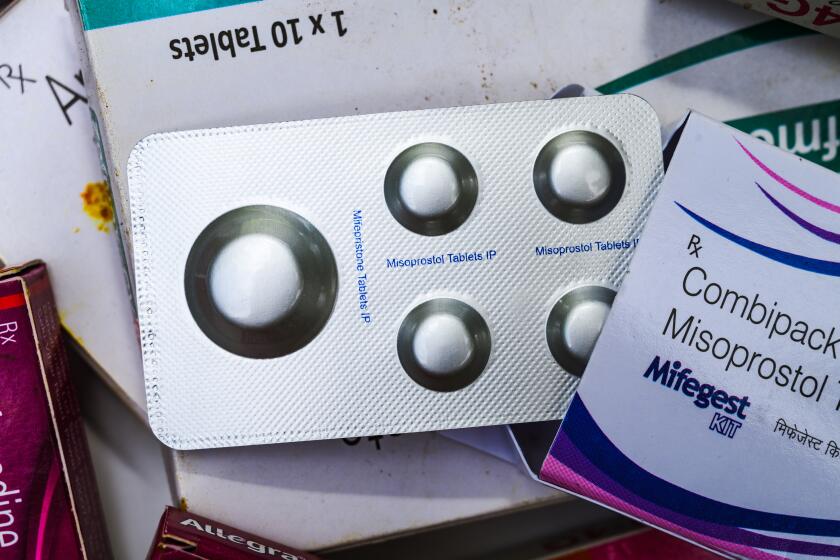Abortion pill ruling: Texas judge revokes FDA approval, but another judge contradicts him

- Share via
ATLANTA — A federal judge in Texas delivered a major blow to reproductive rights advocates Friday, ordering a hold on the Food and Drug Administration approval of mifepristone, an abortion medication used in the United States since 2000.
The ruling, which does not go into effect for seven days and is being appealed by the Biden administration, could effectively halt FDA approval of the medication nationwide, including in California and other states where abortion is legal.
But soon after the Texas decision, a federal judge in Washington state issued a contradictory ruling — ordering the FDA not to make any changes to the availability of the abortion pill.
The dueling rulings set up a largely unprecedented legal battle, likely to reach the U.S. Supreme Court, over the FDA’s rigorous medication approval process. Mifepristone is part of a two-drug combination used in more than half of all U.S. abortions, particularly those conducted early in pregnancy.
U.S. District Judge Matthew Kacsmaryk, a Trump nominee confirmed to the bench in 2019, sided with the Alliance for Hippocratic Medicine, an antiabortion group that filed suit in Texas last year arguing that the FDA had not adequately studied the safety of the drug before granting approval.
Kacsmaryk, who has long held antiabortion views, said the FDA “omitted any evaluation of the psychological effects of the drug or an evaluation of the long-term medical consequences of the drug.” The judge — who consistently used the terms “unborn human” and “unborn child,” rather than “fetus” in the 67-page document — stated that he did not “second-guess FDA’s decision-making lightly.” But he also argued that any analysis of “irreparable injury” could also apply “to the unborn humans extinguished by mifepristone.”
Some supporters of abortion rights have called on the Biden administration and the FDA to ignore Kacsmaryk’s ruling, citing the judge’s outspoken opposition to abortion and the significant data compiled since mifepristone’s approval that show it is safe.
Abortion pills: European doctor vows abortion bans or court rulings won’t stop her from getting medications to U.S. states including Texas, California.
The Justice Department on Friday night put out a statement from Atty. Gen. Merrick Garland that the agency “strongly disagrees” with the decision and will seek a stay as it appeals. “Today’s decision overturns the FDA’s expert judgment, rendered over two decades ago, that mifepristone is safe and effective. The Department will continue to defend the FDA’s decision.”
In the Washington lawsuit, filed by Democratic attorneys general, the preliminary injunction by Judge Thomas O. Rice, who was appointed by President Obama, prohibits the FDA from taking “any action to remove mifepristone from the market or otherwise cause the drug to become less available.”
“The fact that there are two rulings means this is headed eventually for the U.S. Supreme Court, because there’s no way for these two rulings to coexist longer term,” said Mary Ziegler, a UC Davis law professor who specializes in the history of abortion law.
The Texas ruling was “stunning,” she said, because it was “so deeply steeped in movement rhetoric” — calling providers “abortionists” and referring to “intense psychological trauma” to women from using mifepristone.
The Trump-appointed Texas judge in an abortion pill case is a former attorney for a Christian legal group who has ruled on LGBTQ, immigration issues.
It was also striking, Ziegler said, that Kacsmaryk prioritized the plaintiffs’ argument that the Comstock Act of 1873 banned the mailing of anything related to contraception or abortion.
“If you interpret the Comstock as many people in the antiabortion movement do, it means you have a national abortion ban, full stop, right? You can’t mail any abortion drug or device under the logic that Kacsmaryk uses. So the fact that that’s where he’s going first tells you a lot. We’ll see Comstock strategies used against other abortion drugs. We’ll see them used against surgical abortion.”
Residents of blue states such as California, Ziegler said, should be worried. Some justices could be sympathetic to Kacsmaryk’s Comstock argument, she said. “I think there will definitely be some takers in the court.”
Abortion providers who have been preparing for an adverse ruling in Texas say they have medical alternatives that will be available to patients. But the elimination of a key drug used in the preferred process of completing a medication abortion, even temporarily, would represent a new front in the fight over abortion rights after last year’s Supreme Court decision reversing Roe vs. Wade. And experts say the contradictory rulings put the FDA in a bind.
“The FDA is a scientific agency — it really tries to avoid any sort of political limelight — but the agency is just thrust into this mess right now, and it’s going to be forced to make decisions related to abortion access, because of its role regulating mifepristone,” said Greer Donley, an associate law professor at the University of Pittsburgh who specializes in abortion policy.
Donley said the Texas decision was everything she feared: The judge overruled an agency full of scientists about medical decisions.
“The judge goes over and over and over again into all the different ways in which he disagrees with the FDA’s scientific judgment,” Donley said. “This should be very concerning for many people in this country, because it’s opening the door to a world in which people can try to get safe and effective products removed from the market for political reasons and we have more and more political polarization of science.”
The only way the FDA can comply with both orders, Donley said, is through enforcement discretion: making it clear that the agency is not going to target anyone violating the Texas ruling.
“In seven days, barring any sort of different opinion from the 5th Circuit, we know that mifepristone will become an unapproved drug, so manufacturing it and dispensing it will become potentially illegal. But the FDA can say, ‘Hey, we’re not going to go after anybody who does that and provide kind of a safe harbor for those people so that it can remain on the market.’”
On Friday evening, some abortion providers vowed to keep dispensing mifepristone, whatever the Texas judge ruled.
“We follow directives from the FDA, and not antiabortion judges in Texas who lack any formal medical training,” Whole Woman’s Health, an independent abortion provider operating in Illinois, Maryland, Minnesota, New Mexico and Virginia, said in a statement on Twitter. “Whole Woman’s Health will continue to dispense Mife in our clinics and our Pills by Mail Program for the next week as we monitor both decisions.”
Meanwhile, antiabortion groups rejoiced at the Texas ruling, calling the FDA “reckless” and repeating claims against mifepristone’s safety.
“The FDA never had the authority to approve these hazardous drugs and remove important safeguards,” Alliance Defending Freedom senior counsel Erik Baptist said in a statement. “This is a significant victory for the doctors and medical associations we represent and more importantly, the health and safety of women and girls.”
President Biden said in a statement that his administration would fight the Texas decision. “If this ruling were to stand, then there will be virtually no prescription, approved by the FDA, that would be safe from these kinds of political, ideological attacks,” Biden said in a statement.
Reproductive rights advocates stressed that, for now, women can continue to access mifepristone, which they emphasize is safe.
“The judge’s decision in Texas today blocking the FDA’s approval of mifepristone is an outrage and exposes the weaponization of our judicial system to further restrict abortion nationwide,” Alexis McGill Johnson, president and chief executive of Planned Parenthood Federation of America, said in a statement. “However, I want to be clear that access to mifepristone remains safe for now.”
Mini Timmaraju, president of NARAL Pro-Choice America, called a sudden prohibition on mifepristone — coming after the enactment of abortion bans in 17 states — “a perfect storm for a crisis of access and infrastructure in an already fraught environment for providers and patients.”
The standard protocol for an abortion via medication is a combination of two pills — mifepristone to end the pregnancy and misoprostol to cause cramping and bleeding to empty the uterus. The combination is used in 98% of medication abortions in the United States, according to the Guttmacher Institute, a research group that supports abortion rights.
Concerned that pregnant patients may be confused about their options in the wake of the decision, abortion providers and advocates stress that, whatever limits might be placed on mifepristone, medication abortion is still available in the form of misopristol.
“We are ensuring at the state level that we — not only Planned Parenthood but all abortion providers that provide medication abortion in California — have the option of switching to a [misoprostol]-only protocol if that becomes necessary in light of the decision and subsequent actions by the FDA,” said Lisa Matsubara, general counsel and vice president of policy at Planned Parenthood Affiliates of California.
Misoprostol by itself is safe and effective, although not as effective as when the two drugs are used together. A 2019 study found that the two-drug combination was 95% effective at ending a first trimester pregnancy, while misoprostol alone was 78% effective, although higher when multiple doses were administered.
As of mid-2022, about 5.6 million women have used mifepristone in the United States, according to the FDA.
The agency’s 2000 approval of mifepristone, also known as RU-486, was controversial at the time and came after years of public debate over the drug, which had already been approved and in use in Europe. The FDA approved the drug with limitations to how it could be distributed. Many of those restrictions have been repealed in recent years.
In the 1950s and 1960s, the LAPD’s abortion squad hunted down women getting the procedure and the people performing them.
The Alliance for Hippocratic Medicine filed the case in Amarillo, Texas, in hopes of landing it in front of a conservative judge sympathetic to the group’s cause. The federal court in Amarillo is represented by only one judge, so plaintiffs knew Kacsmaryk would hear their case.
Kacsmaryk previously served as deputy general counsel for First Liberty Institute, a Christian conservative nonprofit group. He was one of more than 200 new federal judges placed on the bench under Trump and a Republican-controlled Senate in an acknowledged attempt by conservatives to remake the U.S. judiciary.
Civil rights groups campaigned against Kacsmaryk’s nomination, warning that he was an “anti-LGBT activist and culture warrior” who opposed same-sex marriage and abortion rights.
As a judge, Kacsmaryk has blocked Biden’s plan to reverse Trump’s “Remain in Mexico” immigration policy, a ruling that forced tens of thousands of migrants seeking asylum to wait in Mexico for U.S. immigration court hearings. Last year, he ruled that teenagers need parental consent to obtain birth control and that the Biden administration overstepped its authority when it issued guidelines stating that employers that failed to accommodate transgender employees on dress codes, pronouns and bathroom facilities were guilty of sex discrimination.
“The awful reality is, from the moment this case landed in front of Judge Kacsmaryk, it’s been a rigged game all along. It’s illegitimate,” said Sen. Ron Wyden (D-Ore.). “President Biden and the FDA must ignore it.”
California Gov. Gavin Newsom decried the Texas ruling: “Today’s ruling, by an extremist judge pursuing a radical political agenda, ignores facts, science and the law — putting the health of millions of women and girls at risk.”
Jarvie reported from Atlanta, Haberkorn from Washington.
More to Read
Sign up for Essential California
The most important California stories and recommendations in your inbox every morning.
You may occasionally receive promotional content from the Los Angeles Times.















